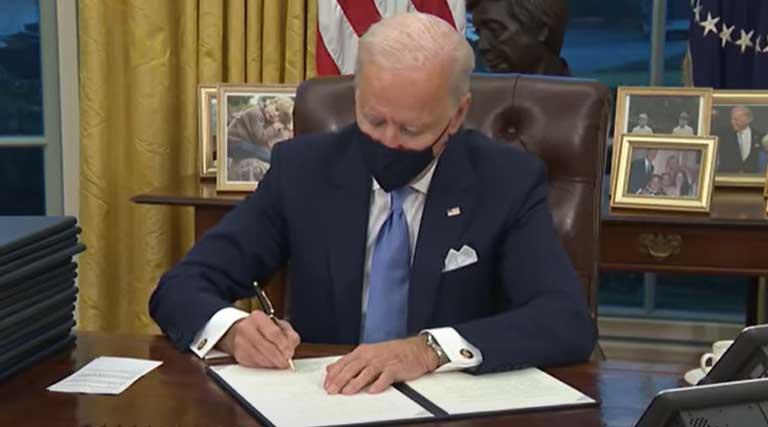President Joe Biden Signed An Executive Order Wednesday That Aims To Prevent His Administration Officials From Joining The Lucrative Washington Influence Industry Shortly After Leaving The Executive Branch.
Photo: President Joe Biden Wednesday signs executive orders.
Photo Credit: White House YouTube Channel
Published January 22, 2021
Center for Responsive Politics [By Karl Evers-Hillstrom]-
President Joe Biden’s Executive Order ethics rules prohibit officials who leave the administration from lobbying the executive branch or registering as foreign agents for two years.
Biden’s plan looks to crack down on “shadow lobbying” where former government officials influence policy but don’t register as lobbyists. The executive order prevents ex-officials from communicating with administration officials for two years after leaving government. It also prohibits senior officials from holding out to lobby or assisting with lobbying activity for one year.
The move came one day after outgoing President Donald Trump rescinded his own executive order that had barred administration officials from lobbying.
Biden’s ethics rules are tougher than those enacted by President Barack Obama, which allowed former administration officials to attract deep-pocketed clients as long as they didn’t register as lobbyists. Several former Obama administration officials nominated for Biden’s Cabinet appeared to take advantage of loopholes in Obama’s ethics rules.
Biden’s Secretary of State nominee Antony Blinken and Secretary of Defense nominee Lloyd Austin worked alongside influential lobbyists at a defense industry investment firm that touted its deep connections to government officials.
Blinken co-founded consulting firm WextExec Advisors alongside other former Obama administration officials, where he brought in big money to advise top lobbying spenders such as Boeing and Facebook. Director of National Intelligence Avril Haines, who was confirmed by the Senate 84-10 Wednesday, also did consulting work for WextExec Advisors. None of them registered as lobbyists.
This kind of “shadow lobbying” is increasingly common, emboldened by lobbying rules that are vague and difficult to enforce under current law. OpenSecrets found that the number of registered lobbyists peaked in 2007 and remained stagnant in recent years, even as the Washington influence industry has grown in size. Lobbying spending surpassed $3.5 billion last year, an all-time high, but that figure doesn’t include payments to unregistered consultants.
Biden’s pledge also prevents registered foreign agents from entering the administration and bars officials from taking “golden parachute” payments from their employers to join the administration. Under the executive order, the Biden administration can waive its own restrictions to hire individuals who are needed for “circumstances related to national security, the economy, public health, or the environment.”
Biden’s ethics rules won praise from former ethics officials. Norman Eisen, Obama’s ethics czar, wrote in Politico this week that Biden’s ethics plan was stronger than Obama’s, arguing it would go further to “drain the swamp” if implemented rigorously.
“The rules are somewhat stricter than before, but the crucial difference is that the rules will be enforced,” Richard Painter, former White House ethics lawyer under President George W. Bush, tweeted Wednesday.
Trump’s executive order barred former officials from lobbying their former agencies for five years. But large numbers of Trump aides left for lobbying anyway by abusing loopholes in the ethics rules that were weakly enforced to begin with.
Hundreds of powerful companies hired former Trump staffers to influence the government’s response to COVID-19. Former Trump administration aides lobbied for firms that ultimately received government contracts to produce vaccines and ventilators. Those former Trump aides stated in lobbying filings they did not lobby executive branch officials.
Several former Trump officials now work for lobbying firms but are not registered as lobbyists. Former White House chief of staff Reince Priebus has not registered as a lobbyist, but he leads a lobbying firm that saw record revenues in 2020. Former Interior Secretary Ryan Zinke joined the lobbying firm Turnberry Solutions shortly after leaving the administration, but did not register as a lobbyist.





